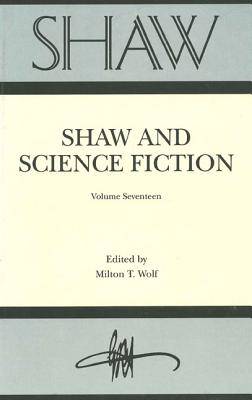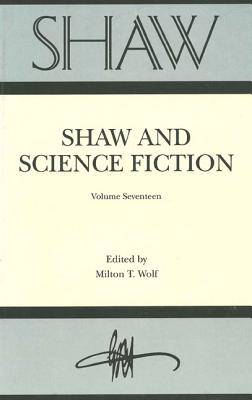
- Retrait gratuit dans votre magasin Club
- 7.000.000 titres dans notre catalogue
- Payer en toute sécurité
- Toujours un magasin près de chez vous
- Retrait gratuit dans votre magasin Club
- 7.000.000 titres dans notre catalogue
- Payer en toute sécurité
- Toujours un magasin près de chez vous
Description
Shaw's speculations about human destiny align him with many other writers of the time, and later, who forged a new genre of literature that ultimately took the name in 1928 of "science fiction." Ray Bradbury affirms Greg Bear's statement about the little-known, but significant, relationship that Bernard Shaw has with science fiction. Bradbury, who frequently emphasizes Shaw's influence on his own work, asks, "Isn't it obvious at last: Those that do not live in the future will be trapped and die in the past?"
Susan Stone-Blackburn, comparing Shaw's Back to Methuselah with Olaf Stapledon's Last and First Men, discusses why science-fiction scholars have been reluctant to acknowledge Shaw's role in the genre. Tom Shippey examines aspects of Shaw's theory of Creative Evolution to show why many have dismissed Shaw's science fiction as insufficiently scientific.
Surveying the science-fiction milieu, Ben P. Indick shows that while Shaw was not interested in writing science fiction per se, he knew the genre and how to use it. Jeffrey M. Wallmann chronicles the science-fiction techniques that Shaw foreshadowed. Rodelle Weintraub analyzes dream-related elements of the fantastic that Shaw frequently employed in his drama. John Barnes focuses on Shaw's "radical superman," a stock-in-trade of science fiction.
Like H. G. Wells, Shaw understood that human intervention was becoming the dominant mechanism of evolution and that new approaches to theatrical drama would be required to convey the social and political impact of the scientific revolution. Elwira M. Grossman compares similar dilemmas facing Shaw and the Polish dramatist Witkacy. J. L. Wisenthal examines the utopian tradition that underlay the English literary experience, and Julie A. Sparks contrasts Karel Capek's anti-utopian concepts with Shaw's utopian vision. Also included is an 1887 lecture by Shaw entitled "Utopias," published here for the first time.
Several of the contributors emphasize the significant influence that Shaw had on major science-fiction writers. Elizabeth Anne Hull explores Shaw's affinities with Arthur C. Clarke, John R. Pfeiffer discusses the many connections between Shaw and Ray Bradbury, and George Slusser explores Shaw and Robert A. Heinlein's "recurrent fascination with the possibilities of life extension."
Like his friend Einstein, Shaw knew that imagination is more important than knowledge. Peter Gahan's article demonstrates that Shaw's ambition was to engage the reader's imagination, the only "sufficient backdrop for his vision."
Also included are reviews of recent additions to Shavian scholarship, including the Shaw/Wells correspondence, and John R. Pfeiffer's "Continuing Checklist of Shaviana."
Spécifications
Parties prenantes
- Auteur(s) :
- Editeur:
Contenu
- Nombre de pages :
- 288
- Langue:
- Anglais
- Collection :
Caractéristiques
- EAN:
- 9780271016818
- Date de parution :
- 20-06-97
- Format:
- Livre relié
- Format numérique:
- Bibliotheekbinding
- Dimensions :
- 157 mm x 235 mm
- Poids :
- 37 g







